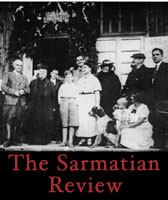
BOOKS BOOKS and Periodicals Received
January 2002
Volume XXII, No. 1
The Other Prussia: Royal Prussia, Poland and Liberty, 1569-1772, by Karin Friedrich. New York: Cambridge University Press, 2000. xix + 280 pages. Hardcover. $64.95.
Finally, a book by a Western historian confirming what Polish historians have known all along and what few Western historians have recognized.
Karin Friedrich argues that the [early modern] "Prussians were neither Germans nor Poles . . . [but] a community of citizens who embraced the constitutional agenda of the multinational [Polish-Lithuanian] Commonwealth" (p. 217). West Prussia was a semi-autonomous part of the Commonwealth, while East Prussia was held by the Hohenzollerns.
The Prussians revolted against the Teutonic Knights in the mid-fifteenth century because the Knights discriminated against local inhabitants of all backgrounds. The Polish king assisted the rebels and, when West Prussia including Gdansk broke away, he granted it self-governing privileges. Of interest is the fact that the Sarmatian myths current in the Commonwealth were also adopted by the Prussians who considered themselves one of the apocryphal Sarmatian tribes.
This book brings a major correction to the history of Eastern and Central Europe as taught at American universities. Whether it will make a dent in the version of European history that is commonly taught remains to be seen.
W sluzbie imperium rosyjskiego, 1721-1917: funkcje i tresci ideowe rosyjskiej architektury sakralnej na zachodnich rubiezach cesarstwa i poza jego granicami (In the Service of the Russian Empire, 1721-1917: The Political Content of Russian Sacred Architecture in the Western Borderlands and beyond the Borders of the Empire), by Piotr Paszkiewicz. Warsaw: The Art Institute of the Polish Academy of Sciences, 1999. 349 pages. An extensive summary in English, hundreds of photographs and drawings, index of names and index of geographical localities and places. In Polish.
A splendidly published quatro book that art libraries around the country should purchase (Rice University's Art Library has a copy). It traces the uses made of religious architecture by Russian politicians and the Russian state. Russians insisted on building Russian Orthodox churches in territories where there were hardly any Russians, with a view to eventually russifying these territories (Poland, the Baltic countries, Ukraine, Belarus) and/or gaining political power by means of architecture suggesting Russian presence in the area (Alaska, Japan, Jerusalem, Mount Athos).
Jan Kochanowski's Threnodies and The Dismissal of the Greek Envoys. A verse translation with an introduction and commentaries by Barry Keane. Katowice: Biblioteka Slaska, 2001. 173 pages. Bibliography, notes. Paper. Bilingual English-Polish.
The first English translation of Kochanowski's remarkable play, The Dismissal of the Greek Envoys (1577), first performed at King Stefan Batory's Court during the wedding of his Royal Chancellor, Jan Zamoyski, to Krystyna Radziwill in 1578. The place of action is Troy shortly before the Greek conquest. The theme of the play is patriotism and justice: Troy's impending fate is obviously meant to prefigure the fall of Poland.
The present translation of the Threnodies is one of several ones available in English (Michael Mikos and Seamus Heaney-Stanislaw Baranczak provided the others). Keane selected a Shakespearian language for his translation, and his work employs Renaissance English.
Umilowanie przyszlosci albo filozofia spraw ostatecznych: Studia nad filozofia Mikolaja Bierdiajewa (Love of the Future, or Philosophy of the Final Things: a Study of Nicholas Berdyaev's Philosophy), by Marek Styczynski. Lódz: Institute of Sovietology-University of Lódz Press, 2001. Ideas in Russia Series. 243 pages. Bibliography, index, English summary. In Polish.
A thorough study of the philosophy of a major Russian religious thinker. Written with flair and an obvious interest in the philosophy of history, this study takes on, in this order, Berdyaev's critique of Marxism, his mystical epistemology, human freedom, evil as created by man, ethics and the final ends of man.
Other Books Received:
- Casimir Pulaski: Cavalry Commander of the American Revolution,
by Francis Casimir Kajencki. El Paso, Texas: Southwest Polonia Press,
2001. xix + 278 pages. Index, bibliography, illustrations. Hardcover.
Price not given.
A study of the American Revolution's most famous cavalryman.
- Teatr i sacrum w sredniowieczu: religia--cywilizacja--estetyka
(Theater and the Sacrum in the Middle Ages), by Andrzej Dabrówka.
Wroclaw: Funna Publishers (51-649 Wroclaw, ul. Bacciarellego 4, Poland),
2001. Monografie Fundacji na Rzecz Nauki Polskiej Series. 672 pages.
Hardcover. An extensive bibliography, summary in English, index of names
and index of topics. In Polish.
A study of the theater in the Middle Ages, its sacral beginning and its religious component. A surprisingly easy style makes the book accessible to an average educated reader. A longer review to follow.
- Grampol: Gramatyka Polska--The Polish Grammar. Katowice: Korto,
2000. A CD ROM with an accompanying booklet covering the essentials
of Polish grammar. Bilingual. Designed to assist in the study of Polish.
- Dzien dobry: podrecznik do nauki jezyka polskiego dla poczatkujacych
(Beginners' Polish), by Aleksandra Janowska and Magdalena Pastuchowa.
Katowice: Wydawnictwo Naukowe Slask, 1999. 213 pages. Paper.
What the title says.
- Wybieram gramatyke, by Malgorzata Kita. Katowice: Wydawnictwo
Uniwersytetu Slaskiego, 1998. 2 vols. 233 + 237 pages. Paper.
A detailed grammar for the students of Polish.
Back to the January 2002 issue
The Sarmatian Review
sarmatia@rice.edu
Last updated 1/31/02